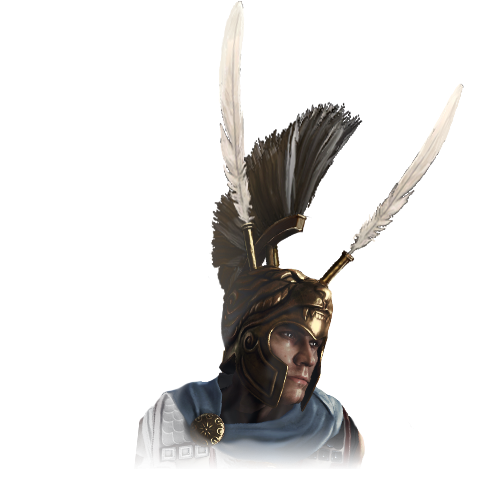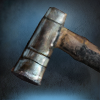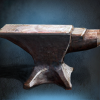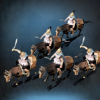Alexander the Great
| Revision as of 19:45, 22 September 2018 | Revision as of 13:41, 10 January 2019 | |||
| Line 1: | Line 1: | |||
| + | {{CeasingARENA}} | |||
| [[File: Alexander_pic.png|700 px|top|Alexander the Great]] | [[File: Alexander_pic.png|700 px|top|Alexander the Great]] | |||
Revision as of 13:41, 10 January 2019
Total War: ARENA servers are offline.
Contents
Abilities
With which units can he be played?
Alexander can be played with spears only, spears and cavalry combined or cavalry only, the last two compositions being the best for him when playing alone.
What is his playstyle?/How to play with him?
Alexander relies on his charge and the combination of Hammer and Anvil to win his engagements. The best tactic is to use one unit to hold the enemy and Anvil it while the other(s) flank and charge.
Some tips
Wedge is very powerful but reduces the impact zone of your unit. Therefore, when charging a unit that is spread wide, use your normal formation to hit as many men as you can.
Wedge can be used to outcharge a unit that has more base charge impact than you.
Disable Wedge when you enter a melee fight as it will otherwise decrease your melee defence significantly
Historical context
Born to King Philip II of Macedon in 356 BC, Alexander III would be next in line to the Macedonian Kingdom. Alexander was taught to fight and ride at an early age, was tutored in the arts, studied philosophy with Aristotle. His mother Olympias claimed Alexander was the son of Zeus making Alexander convinced of his greatness and increased his own ego.
After his father's murder in 336 BC, Alexander went to war with the Persia. Leading 5.100 cavalry and 32.000 infantry, Alexander asked the city of Baalbek in Asia Minor before moving onto liberating Greek cities from Persian control.
In 333 BCE at the Battle of Issos, Alexander drove King Darius III of Persia of the field, he then took Sidon, conquered Aleppo, subdued Syria and marched into Egypt where he was proclaimed to be a god and founded the famous city of Alexandria.
In 331 BC Alexander and Darius would once more meet in battle but despite superior numbers, Darius lost the Battle of Gaugamela.
As Darius was murder by his own men and then the city of Susa heard of this, it surrendered to Alexander and he rode to Persepolis, the seat of many Persian kings where he looted the treasury to pay his men. As he left Persepolis was in ruins and region after region opened the gates without a fight, his fame spread as an invincible warrior and a god, fueling his already large ego.
In 327-226 BC he crossed into India where he fought King Porus of Pauraca at the Battle of the Hydaspes River. Never faced war elephants before Alexanders men fell back in terror but Alexander rallied his troops and won the battle but at the cost of his beloved hose Bucephalus who were killed in the fighting. Alexander now set his goal to conquer all of India but his men refused as they longed for home, though angered by this Alexander finally turned around heading towards Susa.
As he returned to Susa, his companion Hephaestion died to Babylon where Alexander caught a fever and died. In 323 BC Alexander the Great was only 32 years old and he conquered most of the known world, while on his deathbed his generals asked who would succeed him, though it's still not fully known it's commonly believed he answered: "To the strongest". This caused his empire to be divided, setting up power blocks and bitter rivalries which shaped Europe until some small town in Italy rose to power and that small town was called Rome.



